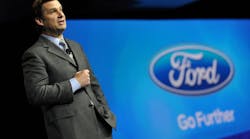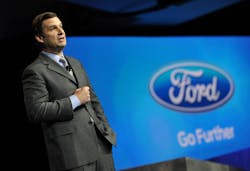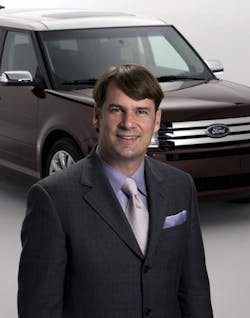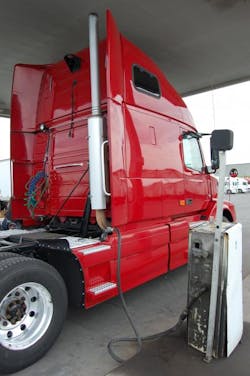For example, he noted that the so-called “Great Recession” has profoundly influenced how consumers weigh purchase decisions and what they value in automobiles such as: the shifting expectations around the term “luxury” and how that term is being forever altered; the rise of women and Hispanics among the vehicle-buyer population; the rapid proliferation of “mobile platforms” within all manner of vehicles; and a renewed – and extremely strong – focus on fuel economy.
"Just as everyone is breathing a huge sigh of relief about getting back to something resembling ‘normal’ sales levels, the real news is that the great recession has dealt a fundamental change to the consumer's mindset," Farley said. "The question of whether consumers are returning to the market is settled. Now the question is, 'What do they want and expect from us, and are we really ready to respond to what has just taken place?'"
[As a tangent, check out Farley’s thoughts below on how “digital connectivity” is changing how people perceive and interact with automakers.]
Take the term “luxury” for starters, for Farley believes it is a word no longer defined by price, size, or exclusivity. "Now, people are breaking the association of luxury with a high price tag," he emphasized. "They are looking for luxury-level quality, performance and features in smaller sizes and at more reasonable price levels."
Farley pointed to a recent Luxury Institute survey found 60% of respondents expect a fully equipped luxury vehicle [a light vehicle in this case] to cost less than $60,000 – significantly less than the former $100,000 price tag standard on many luxury models.
[That’s not necessarily set in stone, though, at least according to this story from Reuters about demand for GM’s heavy pickups.]
Another “anti-luxury” trend of sorts: sales of small sport utility vehicles (SUVs) are outpacing all other luxury vehicle segments for growth, with nearly a 60% jump in 2012 and a more than 200% increase in the past four years. Mayhap buyers want more “functionality” in terms of greater cargo-carrying capacity for such “luxury” vehicles in the past, as well.Here’s an important demographic change to consider: Though baby boomers are expected to continue wielding the greatest influence on the light vehicle market for years to come, Farley pointed to shifts among women, Hispanics and “Millennials” that are inexorably reshaping the entire consumer vehicle landscape.
Perhaps the most powerful trend is the rising consumer power of women globally, he said. "More than 1 billion women will enter the middle class globally by 2020, and many will be buying vehicles for the first time," Farley stressed.
Why? Because rapid urbanization is drawing women into cities all over the world, where they are trading in agricultural work for careers in business and other professions. In fact, women buyers are outpacing men for the first time ever in the U.S., Farley said.
Meanwhile, Hispanic households are becoming increasingly affluent in this country, with a 126% increase in U.S. Hispanic households making more than $100,000 a year. On top of that, Hispanic households collectively maintain a total net worth of more than $500 billion in ths country, Farley emphasized.
"As Hispanics buy luxury vehicles at a faster rate than the overall market, our brands must become more compelling, interesting and relevant than ever," he added. "Millennials are also a significant opportunity, as they will start entering the family stage in record numbers during the next several years."
So the question for trucking is; how do such demographic shifts affect the purchase of vocational equipment and tractor-trailers?
[I’ll tell you one thing, at least, that isn’t changing: William Shatner and the Gorn are ALWAYS going to be at loggerheads.]
Here’s something else that’s creating big ripple effects in the vehicle world: Mobile devices.
“They are significantly reshaping every part of the automotive landscape – from marketing and shopping to the in-vehicle experience,” Farley said. “We need to learn to think the way our customers already do – they come first, they are in control. For most of us recognize that ‘mobile devices’ are a power enabler for customers, putting them in control of the shopping process and changing their expectations around connectivity."Indeed, as nearly one in seven people worldwide now uses a smart phone, this has significant influence on the auto industry, cautioned Farley – not only in terms of what technology OEMs put into their vehicles but how said vehicles are spec’d, bought, and sold in the first place.
Doug Frisbie, Facebook’s head of automotive vertical marketing, joined Farley during his keynote presentation, to add his thoughts on how mobile devices are, in his words, “putting people again at the center.”
"Cars were a step change in giving society the ability to stay connected and engaged with the people they cared about," Frisbie explained. "The opportunity at hand today is not about phones or social software in cars – but about remembering that no matter the device, it's the ability to connect that matters."
Brendan Kraham, Google’s director of global mobile sales and product strategy, added some thoughts as well – noting that the “in-car mobile experience” will soon be integrated into all the devices that connect a consumer's life.
"Automobiles will soon become a seamless part of the consumer mobile experience," Kraham explained. "Actually it will enhance the experience. When your dash becomes a seamlessly connected screen, it truly becomes a more important, integrated part of your life."
Again: how does this technological trend line affect trucking?
Yet Ford’s Farley believes perhaps the greatest cross-demographic shift to come out of the “Great Recession” is the growing consumer focus on fuel economy.Now the top consideration for vehicle purchases, fuel economy interest has resulted in a flood of claims and data that are starting to overwhelm the market, he explained.
"We now have a torrent of 'best-in-class' claims hitting consumers from all sides, and it's starting to become noise," Farley said. "We are seeing more and more confusion as consumers try to make informed decisions. Given the connectivity in our cars and the proliferation of mobile devices, we have the opportunity to give consumers better and more relevant data to understand what they can expect in on-the-road fuel economy performance."
This is where Farley thinks harnessing the power of mobile platforms comes into play, Fnoting that software developers are going to get access to Ford's OpenXC connectivity research platform as a “sandbox” to create and test innovative ideas in the newly announced $50,000 Personalized Fuel Efficiency App Challenge.
Many elements factor into personalized fuel efficiency including temperature, terrain, traffic conditions and individual driving styles, Farley noted, so the goal of this particular challenge is to enable drivers to optimize their efficiency on the road and then share that information with others.
"We need to help customers understand the concept of personal fuel economy, based on their own individualized experiences,” he explained. “Then we need to give them tools to see, learn and act upon all the information available to know what to expect, how to improve, and even offer guidance in their shopping process.”
In a lot of ways, that almost mirrors what truck makers are trying to do with their customer base – something Freightliner Trucks’ Mark Lampert noted during a talk with industry journalists last year.
These are proving to be interesting times, indeed, where the “mindset” regarding vehicles of all shapes and sizes is concerned.







